- Home
- Edith Wharton
The Line of Least Resistance
The Line of Least Resistance Read online
THE LINE OF LEAST RESISTANCE By Edith Wharton Author of "The Greater Inclination"
I.
MILLICENT was late--as usual. Mr. Mindon, returning unexpectedly from an interrupted yacht-race, reached home with the legitimate hope of finding her at luncheon; but she was still out. "Was she lunching out then?" he asked the butler, who replied, with the air of making an uncalled-for concession to his master’s curiosity, that Mrs. Mindon had given no orders about luncheon.
Mr. Mindon, on this negative information (it was the kind from which his knowledge of his wife’s movements was mainly drawn), sat down to the grilled cutlet and glass of Vichy that represented his share in the fabulous daily total of the chef’s book. Mr. Mindon’s annual food-consumption probably amounted to about half of one per cent. on his cook’s perquisites, and of the other luxuries of his complicated establishment he enjoyed considerably less than this fraction. Of course, it was nobody’s fault but his own. As Millicent pointed out, she couldn’t feed her friends on mutton- chops and Vichy because of his digestive difficulty, nor could she return their hospitality by asking them to play croquet with the children because that happened to be Mr. Mindon’s chosen pastime. If that was the kind of life he wanted to lead he should have married a dyspeptic governess, not a young confiding girl, who little dreamed what marriage meant when she passed from her father’s roof into the clutches of a tyrant with imperfect gastric secretions.
It was his fault, of course, but then Millicent had faults too, as she had been known to concede when she perceived that the contemplation of her merits was beginning to pall; and it did seem unjust to Mr. Mindon that their life should be one long adaptation to Millicent’s faults at the expense of his own. Millicent was unpunctual--but that gave a sense of her importance to the people she kept waiting; she had nervous attacks--but they served to excuse her from dull dinners and family visits; she was bad- tempered--but that merely made the servants insolent to Mr. Mindon; she was extravagant--but that simply necessitated Mr. Mindon’s curtailing his summer holiday and giving a closer attention to business. If ever a woman had the qualities of her faults, that woman was Millicent. Like the legendary goose, they laid golden eggs for her, and she nurtured them tenderly in return. If Millicent had been a perfect wife and mother, she and Mr. Mindon would probably have spent their summer in the depressing promiscuity of hotel piazzas. Mr. Mindon was shrewd enough to see that he reaped the advantages of his wife’s imperfect domesticity, and that if her faults were the making of her, she was the making of him. It was therefore unreasonable to be angry with Millicent, even if she were late for luncheon, and Mr. Mindon, who prided himself on being a reasonable man, usually found some other outlet for his wrath.
On this occasion it was the unpunctuality of the little girls. They came in with their governess some minutes after he was seated: two small Millicents, with all her arts in miniature. They arranged their frocks carefully before seating themselves and turned up their little Greek noses at the food. Already they showed signs of finding fault with as much ease and discrimination as Millicent; and Mr. Mindon knew that this was an accomplishment not to be undervalued. He himself, for example, though Millicent charged him with being a discontented man, had never acquired her proficiency in depreciation; indeed, he sometimes betrayed a mortifying indifference to trifles that afforded opportunity for the display of his wife’s fastidiousness. Mr. Mindon, though no biologist, was vaguely impressed by the way in which that accomplished woman had managed to transmit an acquired characteristic to her children: it struck him with wonder that traits of which he had marked the incipience in Millicent should have become intuitions in her offspring. To rebuke such costly replicas of their mother seemed dangerously like scolding Millicent--and Mr. Mindon’s hovering resentment prudently settled on the governess.
He pointed out to her that the children were late for luncheon.
The governess was sorry, but Gladys was always unpunctual. Perhaps her papa would speak to her.
Mr. Mindon changed the subject. "What’s that at my feet? There’s a dog in the room!"
He looked round furiously at the butler, who gazed impartially over his head. Mr. Mindon knew that it was proper for him to ignore his servants, but was not sure to what extent they ought to reciprocate his treatment.
The governess explained that it was Gwendolen’s puppy.
"Gwendolen’s puppy? Who gave Gwendolen a puppy?"
"Fwank Antwim," said Gwendolen through a mouthful of mushroom souffle.
"Mr. Antrim," the governess suggested, in a tone that confessed the futility of the correction.
" We don’t call him Mr. Antrim; we call him Frank; he likes us to," said Gladys icily.
"You’ll do no such thing!" her father snapped.
A soft body came in contact with his toe. He kicked out viciously, and the room was full of yelping.
"Take the animal out instantly!" he stormed: dogs were animals to Mr. Mindon. The butler continued to gaze over his head, and the two footmen took their cue from the butler.
"I won’t--I won’t--I won’t let my puppy go!" Gwendolen violently lamented.
But she should have another, her father assured her--a much handsomer and more expensive one; his darling should have a prize dog; he would telegraph to New York on the instant.
"I don’t want a pwize dog; I want Fwank’s puppy!"
Mr. Mindon laid down his fork and walked out of the room, while the governess, cutting up Gwendolen’s nectarine, said, as though pointing out an error in syntax, "You’ve vexed your papa again."
"I don’t mind vexing papa--nothing happens," said Gwendolen, hugging her puppy; while Gladys, disdaining the subject of dispute, contemptuously nibbled caramels. Gladys was two years older than Gwendolen and had outlived the first freshness of her enthusiasm for Frank Antrim, who, with the notorious indiscrimination of the grown-up, always gave the nicest presents to Gwendolen.
Mr. Mindon, crossing his marble hall between goddesses whose dishabille was still slightly disconcerting to his traditions, stepped out on the terrace above the cliffs. The lawn looked as expensive as a velvet carpet woven in one piece; the flower-borders contained only exotics; and the stretch of blue-satin Atlantic had the air of being furrowed only by the keels of pleasure-boats. The scene, to Mr. Mindon’s imagination, never lost the keen edge of its costliness; he had yet to learn Millicent’s trick of regarding a Newport villa as a mere pied à terre; but he could not help reflecting that, after all, it was to him she owed her fine sense of relativity. There are certain things one must possess in order not to be awed by them, and it was he who had enabled Millicent to take a Newport villa for granted. And still she was not satisfied! She had reached the point where taking the exceptional as a matter of course becomes in itself a matter of course; and Millicent could not live without novelty. That was the worst of it: she discarded her successes as rapidly as her gowns; Mr. Mindon felt a certain breathlessness in retracing her successive manifestations. And yet he had always made allowances: literally and figuratively, he had gone on making larger and larger allowances, till his whole income, as well as his whole point of view, was practically at Millicent’s disposal. But, after all, there was a principle of give and take-- if only Millicent could have been brought to see it! One of Millicent’s chief sources of strength lay in her magnificent obtuseness: there were certain obligations that simply didn’t exist for her, because she couldn’t be brought to see them, and the principle of give and take (a favorite principle of Mr. Mindon’s) was one of them.
There was Frank Antrim, for instance. Mr. Mindon, who had a high sense of propriety, had schooled himself, not without difficulty, into thinking Antrim a charming fellow. No one was mo
re alive than Mr. Mindon to the expediency of calling the Furies the Eumenides. He knew that as long as he chose to think Frank Antrim a charming fellow, everything was as it should be and his home a temple of the virtues. But why on earth did Millicent let the fellow give presents to the children? Mr. Mindon was dimly conscious that Millicent had been guilty of the kind of failure she would least have liked him to detect--a failure in taste,--and a certain exultation tempered his resentment. To anyone who had suffered as Mr. Mindon had from Millicent’s keenness in noting such lapses in others, it was not unpleasant to find that she could be "bad form." A sense of unwonted astuteness fortified Mr. Mindon’s wrath. He felt that he had every reason to be angry with Millicent, and decided to go and scold the governess; then he remembered that it was bad for him to lose his temper after eating, and, drawing a small phial from his pocket, he took a pepsin tablet instead.
Having vented his wrath in action, he felt calmer, but scarcely more happy. A marble nymph smiled at him from the terrace; but he knew how much nymphs cost, and was not sure that they were worth the price. Beyond the shrubberies he caught a glimpse of domed glass. His green-houses were the finest in Newport; but since he neither ate fruit nor wore orchids, they yielded at best an indirect satisfaction. At length he decided to go and play with the little girls; but on entering the nursery he found them dressing for a party, with the rapt gaze and fevered cheeks with which Millicent would presently perform the same rite. They took no notice of him, and he crept downstairs again.
His study table was heaped with bills, and as it was bad for his digestion to look over them after luncheon, he wandered on into the other rooms. He did not stay long in the drawing-room: it evoked too vividly the evening hours when he delved for platitudes under the inattentive gaze of listeners who obviously resented his not being somebody else. Much of Mr. Mindon’s intercourse with ladies was clouded by the sense of this resentment, and he sometimes avenged himself by wondering if they supposed he would talk to them if he could help it. The sight of the dining-room door increased his depression by recalling the long dinners where, with the pantry-draught on his neck, he languished between the dullest women of the evening. He turned away; but the ball-room beyond roused even more disturbing associations: an orchestra playing all night (Mr. Mindon crept to bed at eleven), carriages shouted for under his windows, and a morrow like the day after an earthquake.
In the library he felt less irritated but not more cheerful. Mr. Mindon had never quite known what the library was for: it was like one of those mysterious ruins over which archaeology endlessly disputes. It could not have been intended for reading, since no one in the house ever read, except an under-housemaid charged with having set fire to her bed in her surreptitious zeal for fiction; and smoking was forbidden there, because the hangings held the odor of tobacco. Mr. Mindon felt a natural pride in being rich enough to permit himself a perfectly useless room; but not liking to take the bloom from its inutility by sitting in it, he passed on to Millicent’s boudoir.
Here at least was a room of manifold purposes, the centre of Millicent’s complex social system. Mr. Mindon entered with the awe of the modest investor treading the inner precincts of finance. He was proud of Millicent’s social activities and liked to read over her daily list of engagements and the record of the invitations she received in a season. The number was perpetually swelling, like a rising stock. Mr. Mindon had a vague sense that she would soon be declaring an extra dividend. After all, one must be lenient to a woman as hard-working as Millicent. All about him were the evidences of her toil: her writing-table disappeared under an avalanche of notes and cards; the waste-paper basket overflowed with torn correspondence; and, glancing down, Mr. Mindon saw a crumpled letter at his feet. Being a man of neat habits, he was often tried by Millicent’s genial disorder; and his customary rebuke was the act of restoring the strayed object to its place.
He stooped to gather the bit of paper from the floor. As he picked it up his eye caught a word; he smoothed the page and read on. . . .
II.
HE seemed to be cowering on the edge of a boiling flood, watching his small thinking faculty spin round out of reach on the tumult of his sensations. Then a fresh wave of emotion swept the tiny object--the quivering imperceptible ego--back to shore, and it began to reach out drowned tentacles in a faint effort after thought.
He sat up and glanced about him. The room looked back at him, coldly, unfamiliarly, as he had seen Millicent look when he asked her to be reasonable. And who are you? the walls seemed to say. Who am I? Mr. Mindon heard himself retorting. I’ll tell you, by God! I’m the man that paid for you--paid for every scrap of you: silk hangings, china rubbish, glasses, chandeliers,--every Frenchified rag of you. Why, if it weren’t for me and my money you’d be nothing but a brick-and-plaster shell, naked as the day you were built--no better than a garret or a coal-hole. Why, you wouldn’t be at all if I chose to tear you down. I could tear the whole house down, if I chose.
He paused, suddenly aware that his eyes were on a photograph of Millicent, and that it was his wife he was apostrophizing. Her lips seemed to shape a "hush:" when he said things she didn’t like she always told him not to talk so loud. Had he been talking loud? Well, who was to prevent him? Wasn’t the house his and everything in it? Who was Millicent, to bid him hush?
Mr. Mindon felt a sudden increase of stature. He strutted across the room. Why, of course, the room belonged to him, the house belonged to him, and he belonged to himself! That was the best of it! For years he had been the man that Millicent thought him, the mere projection of her disdain; and now he was himself.
It was odd how the expression of her photograph changed, melting, as her face did, from contempt to cajolery, in one of those transitions that hung him breathless on the skirts of her mood. She was looking at him gently now, sadly almost, with the little grieved smile that seemed always to anticipate and pardon his obtuseness. Ah, Millicent! The clock struck and Mr. Mindon stood still. Perhaps she was smiling so now--or the other way. He could have told the other fool where each of her smiles led. There was a fierce enjoyment in his sense of lucidity. He saw it all now. Millicent had kept him for years in bewildered subjection to exigencies as inscrutable as the decrees of Providence; but now his comprehension of her seemed a mere incident in his omniscience.
His sudden translation to the absolute gave him a curious sense of spectatorship: he seemed to be looking on at his own thoughts. His brain was like a brightly lit factory, full of flying wheels and shuttles. All the machinery worked with the greatest rapidity and precision. He was planning, reasoning, arguing, with unimagined facility: words flew out like sparks from each revolving thought. But suddenly he felt himself caught in the wheels of his terrific logic, and swept round, red and shrieking, till he was flung off into space.
The acuter thrill of one sobbing nerve detached itself against his consciousness. What was it that hurt so? Someone was speaking: a voice probed to the central pain,--
"Any orders for the stable, sir?"
And Mr. Mindon found himself the mere mouth-piece of a roving impulse that replied,--
"No; but you may telephone for a cab for me--at once."
III.
HE drove to one of the hotels. He was breathing more easily now, restored to the safe level of conventional sensation. His late ascent to the rarefied heights of the unexpected had left him weak and exhausted; but he gained reassurance from the way in which his thoughts were slipping back of themselves into the old grooves. He was feeling, he was sure, just as a gentleman ought to feel; all the consecrated phrases--"outraged honor," "a father’s heart," "the sanctity of home"--were flocking glibly at his call. He had the self-confidence that comes of knowing one has on the right clothes. He had certainly done the proper thing in leaving the house at once; but, too weak and tired to consider the next step, he yielded himself to one of those soothing intervals of abeyance when life seems to wait submissively at the door.
As his cab breasted th
e current of the afternoon drive he caught the greeting of the lady with whom he and Millicent were to have dined. He was troubled by the vision of that disrupted dinner. He had not yet reached the point of detachment at which offending Mrs. Targe might become immaterial, and again he felt himself jerked out of his grooves. What ought he to do? Millicent, now, could have told him--if only he might have consulted Millicent! He pulled himself together and tried to think of his wrongs.
At the hotel, the astonished clerk led him upstairs, unlocking the door of a room that smelt of cheap soap. The window had been so long shut that it opened with a jerk, sending a shower of dead flies to the carpet. Out along the sea-front, at that hour, the south-wind was hurrying the waters, but the hotel stood in one of the sheltered streets, where in midsummer there is little life in the air. Mr. Mindon sat down in the provisional attitude of a visitor who is kept waiting. Over the fireplace hung a print of the Landing of Columbus; a fly-blown portrait of General Grant faced it from the opposite wall. The smell of soap was insufferable, and hot noises came up irritatingly from the street. He looked at his watch: it was just four o’clock.
He wondered if Millicent had come in yet, and if she had read his letter. The occupation of picturing how she would feel when she read it proved less exhilarating than he had expected, and he got up and wandered about the room. He opened a drawer in the dressing-table, and seeing in it some burnt matches and a fuzz of hair, shut it with disgust; but just as he was ringing to rebuke the house-maid he remembered that he was not in his own house. He sat down again, wondering if the afternoon post were in, and what letters it had brought. It was annoying not to get his letters. What would be done about them? Would they be sent after him? Sent where? It suddenly occurred to him that he didn’t in the least know where he was going. He must be going somewhere, of course; he hadn’t left home to settle down in that stifling room. He supposed he should go to town, but with the heat at ninety the prospect was not alluring. He might decide on Lenox or Saratoga; but a doubt as to the propriety of such a course set him once more adrift on a chartless sea of perplexities. His head ached horribly and he threw himself on the bed.

 The Age of Innocence
The Age of Innocence The Reef
The Reef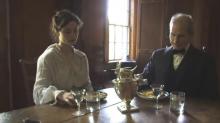 Summer
Summer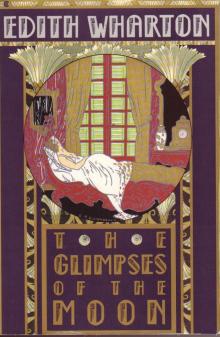 The Glimpses of the Moon
The Glimpses of the Moon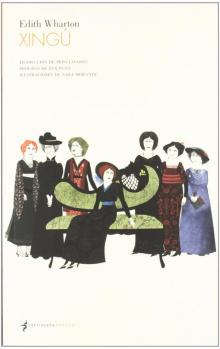 Xingu
Xingu The Fruit of the Tree
The Fruit of the Tree Fast and Loose
Fast and Loose Artemis to Actaeon and Other Verse
Artemis to Actaeon and Other Verse The Line of Least Resistance
The Line of Least Resistance The Lamp of Psyche
The Lamp of Psyche The Reckoning
The Reckoning Afterward
Afterward The New York Stories of Edith Wharton
The New York Stories of Edith Wharton The 2014 Halloween Horrors Megapack
The 2014 Halloween Horrors Megapack 'Copy': A Dialogue
'Copy': A Dialogue The Recovery
The Recovery The Fulness of Life
The Fulness of Life Early Short Stories Vol. 1
Early Short Stories Vol. 1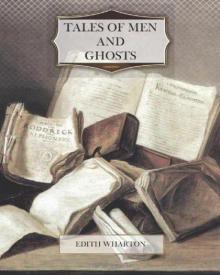 Tales of Men and Ghosts
Tales of Men and Ghosts The House of the Dead Hand
The House of the Dead Hand That Good May Come
That Good May Come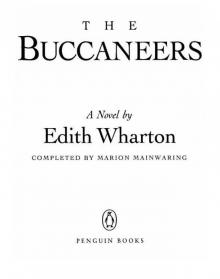 The Buccaneers
The Buccaneers Other Times, Other Manners
Other Times, Other Manners The Hermit and the Wild Woman
The Hermit and the Wild Woman Kerfol
Kerfol The Duchess at Prayer
The Duchess at Prayer Bunner Sisters
Bunner Sisters The Choice
The Choice Madame De Treymes
Madame De Treymes Ethan Frome, Summer, Bunner Sisters
Ethan Frome, Summer, Bunner Sisters In Morocco
In Morocco The Valley of Decision
The Valley of Decision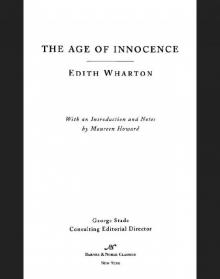 Age of Innocence (Barnes & Noble Classics Series)
Age of Innocence (Barnes & Noble Classics Series) The Angel at the Grave
The Angel at the Grave April Showers
April Showers Sanctuary
Sanctuary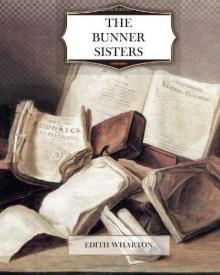 The Bunner Sisters
The Bunner Sisters Mrs. Manstey's View
Mrs. Manstey's View Writing a War Story
Writing a War Story The Custom of the Country
The Custom of the Country In Trust
In Trust The Triumph of the Night
The Triumph of the Night The Hermit and the Wild Woman, and Other Stories
The Hermit and the Wild Woman, and Other Stories Roman Fever and Other Stories
Roman Fever and Other Stories The Mission of Jane
The Mission of Jane The Descent of Man and Other Stories
The Descent of Man and Other Stories Coming Home
Coming Home The Touchstone
The Touchstone Early Short Stories Vol. 2
Early Short Stories Vol. 2 Edith Wharton's Verse, 1879-1919, from various journals.
Edith Wharton's Verse, 1879-1919, from various journals.